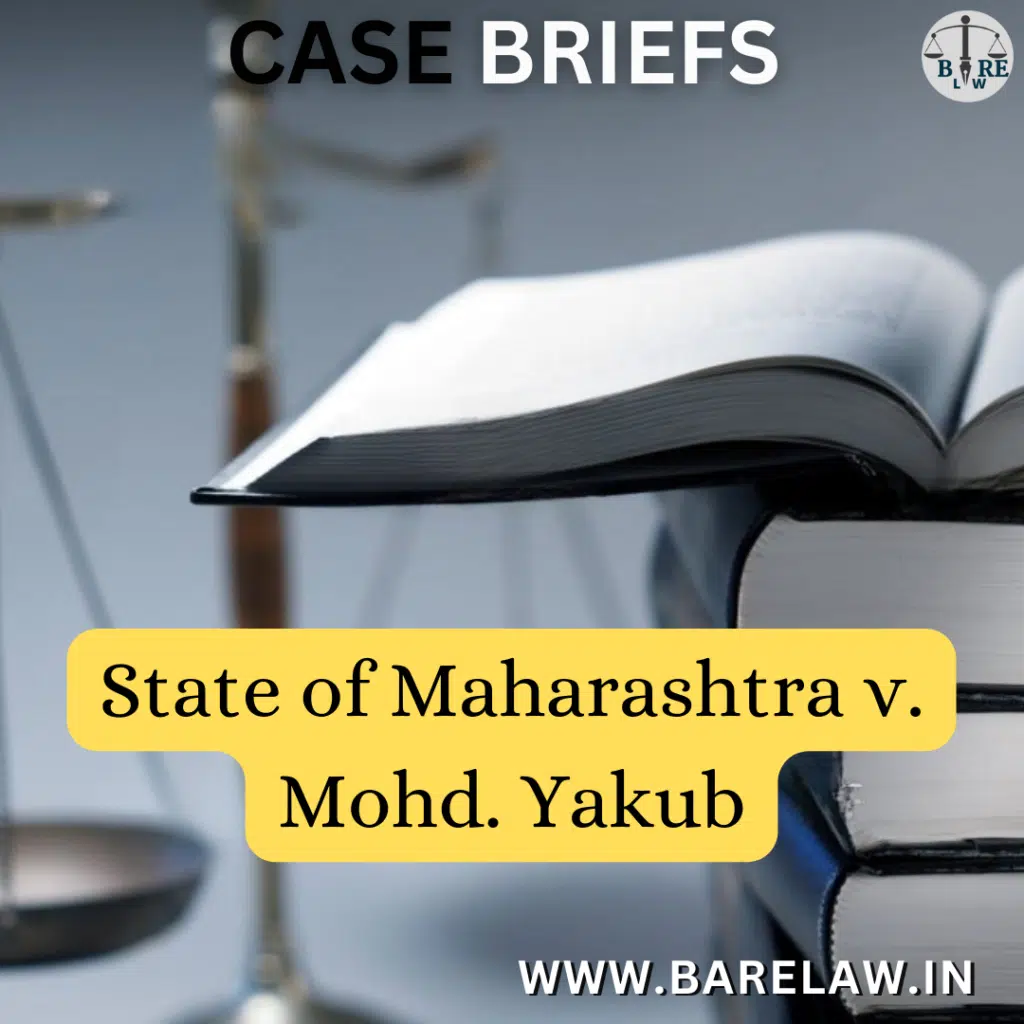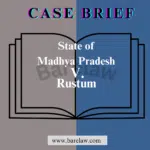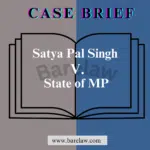
Table of Contents
State of Maharashtra v. Mohd. Yakub
State of Maharashtra v. Mohd. Yakub
Date of Decision:
March 4, 1980
Facts:
State of Maharashtra v. Mohd. Yakub is a case that deals with the offense of attempting to commit an offense under Section 511 of the Indian Penal Code. The following are the facts of the case:
- The Offense: The respondents were charged with attempting to commit an offense under Section 511 of the Indian Penal Code.
- The Trial Court: The trial court acquitted the respondents, finding that the prosecution had failed to prove that the respondents had taken any step towards the commission of the offense.
- The High Court: On appeal, the High Court reversed the decision of the trial court and convicted the respondents.
- The Appeal: The respondents appealed the conviction to the Supreme Court of India.
- The Ruling: The Supreme Court held that the prosecution had failed to prove that the respondents had taken any step towards the commission of the offense. The Court held that mere intention cannot be a sufficient ground to prove a person guilty of an offense. The prosecution must prove that the accused had taken some step towards the commission of the offense to constitute an attempt. The Court, therefore, set aside the conviction and acquitted the respondents.
In summary, State of Maharashtra v. Mohd. Yakub is a case that deals with the offense of attempting to commit an offense under Section 511 of the Indian Penal Code. The Supreme Court held that the prosecution had failed to prove that the respondents had taken any step towards the commission of the offense and acquitted them of the charges.
The case established that mere intention cannot be a sufficient ground to prove a person guilty of an offense. The prosecution must prove that the accused had taken some step towards the commission of the offense to constitute an attempt.
Issues
State of Maharashtra v. Mohd. Yakub is a case that deals with the offense of attempting to commit an offense under Section 511 of the Indian Penal Code. The following are the issues of the case:
- Attempt to Commit an Offense: The case deals with the offense of attempting to commit an offense under Section 511 of the Indian Penal Code. The respondents were charged with attempting to commit an offense under Section 511 of the Indian Penal Code.
- Intent to Commit an Offense: The case determines whether the respondents had the intention to commit an offense under Section 511 of the Indian Penal Code. The prosecution must prove that the accused had the intention to commit the offense.
- Distinction between Attempt and Preparation: The case makes a clear distinction between attempt and preparation. The Court held that mere preparation does not amount to an offense until and unless it is completed or attempted.
- Acquittal: The Supreme Court held that the respondents had not taken any step towards the commission of the offense and acquitted them of the charges.
- Importance: The case established that mere intention cannot be a sufficient ground to prove a person guilty of an offense. The prosecution must prove that the accused had taken some step towards the commission of the offense to constitute an attempt.
In summary, the State of Maharashtra v. Mohd. Yakub case deals with the offense of attempting to commit an offense under Section 511 of the Indian Penal Code. The Supreme Court held that the prosecution had failed to prove that the respondents had taken any step towards the commission of the offense and acquitted them of the charges.
The case established that mere intention cannot be a sufficient ground to prove a person guilty of an offense. The prosecution must prove that the accused had taken some step towards the commission of the offense to constitute an attempt.
Holding
The holdings of the State of Maharashtra v. Mohd. Yakub case are as follows:
- The respondents were charged with attempting to commit an offense under Section 511 of the Indian Penal Code.
- The Supreme Court held that the prosecution had failed to prove that the respondents had taken any step towards the commission of the offense.
- The Court held that mere intention cannot be a sufficient ground to prove a person guilty of an offense. The prosecution must prove that the accused had taken some step towards the commission of the offense to constitute an attempt.
- The Court made a clear distinction between attempt and preparation. Mere preparation does not amount to an offense until and unless it is completed or attempted.
- The Court, therefore, set aside the conviction and acquitted the respondents.
In summary, the State of Maharashtra v. Mohd. Yakub case deals with the offense of attempting to commit an offense under Section 511 of the Indian Penal Code. The Supreme Court held that the prosecution had failed to prove that the respondents had taken any step towards the commission of the offense and acquitted them of the charges.The case established that mere intention cannot be a sufficient ground to prove a person guilty of an offense.
The prosecution must prove that the accused had taken some step towards the commission of the offense to constitute an attempt. The Court made a clear distinction between attempt and preparation, and held that mere preparation does not amount to an offense until and unless it is completed or attempted.
Disposition
State of Maharashtra v. Mohd. Yakub is a case that deals with the offense of attempting to commit an offense under Section 511 of the Indian Penal Code. The Supreme Court held that the prosecution had failed to prove that the respondents had taken any step towards the commission of the offense.
The Court made a clear distinction between attempt and preparation, and held that mere preparation does not amount to an offense until and unless it is completed or attempted. The Court, therefore, set aside the conviction and acquitted the respondents.
In summary, the State of Maharashtra v. Mohd. Yakub case deals with the offense of attempting to commit an offense under Section 511 of the Indian Penal Code. The Supreme Court held that the prosecution had failed to prove that the respondents had taken any step towards the commission of the offense and acquitted them of the charges.
The case established that mere intention cannot be a sufficient ground to prove a person guilty of an offense. The prosecution must prove that the accused had taken some step towards the commission of the offense to constitute an attempt.
The Court made a clear distinction between attempt and preparation, and held that mere preparation does not amount to an offense until and unless it is completed or attempted. The case is important as it clarifies the distinction between preparation and attempt and emphasizes the importance of proving that the accused had taken some step towards the commission of the offense to constitute an attempt.
Summary
State of Maharashtra v. Mohd. Yakub is a case that was heard by the Supreme Court of India in 1980. The case deals with the offense of attempting to commit an offense under Section 511 of the Indian Penal Code. The respondents were charged with attempting to commit an offense under Section 511 of the Indian Penal Code.
The trial court acquitted the respondents, finding that the prosecution had failed to prove that the respondents had taken any step towards the commission of the offense. On appeal, the High Court reversed the decision of the trial court and convicted the respondents. The respondents appealed the conviction to the Supreme Court of India. The Supreme Court held that the prosecution had failed to prove that the respondents had taken any step towards the commission of the offense.
The Court made a clear distinction between attempt and preparation, and held that mere preparation does not amount to an offense until and unless it is completed or attempted. The Court, therefore, set aside the conviction and acquitted the respondents.
In summary, State of Maharashtra v. Mohd. Yakub is a case that deals with the offense of attempting to commit an offense under Section 511 of the Indian Penal Code. The Supreme Court held that the prosecution had failed to prove that the respondents had taken any step towards the commission of the offense and acquitted them of the charges.
The case established that mere intention cannot be a sufficient ground to prove a person guilty of an offense. The prosecution must prove that the accused had taken some step towards the commission of the offense to constitute an attempt. The Court made a clear distinction between attempt and preparation, and held that mere preparation does not amount to an offense until and unless it is completed or attempted.



